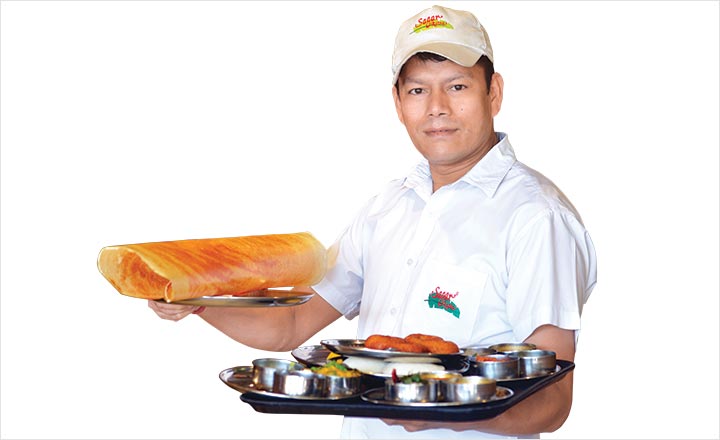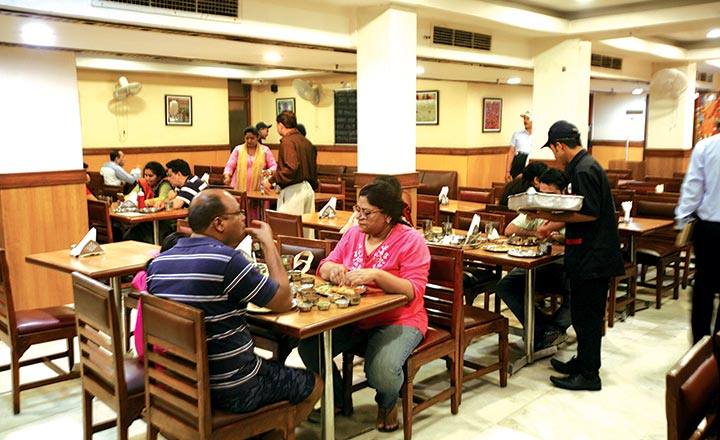“Agar baccha bigad jaye, usko theek karne mein bhi thoda time toh lagta hi hai (If a kid goes wayward, it takes time to reform him),” says Jayaram Banan, the 64-year-old founder of Delhi-NCR’s favourite south Indian food chain, Sagar Ratna. Banan’s journey is a quintessential rags-to-riches story of a 13-year-old who ran away from his village in Karnataka, after flunking an exam; worked as a waiter in Mumbai and then finally in 1986 set up Sagar Ratna in Delhi. Over the next two decades, the restaurant found a fan following across Delhi — a market where people had limited options for authentic south Indian food.
Second Serving
Jayaram Banan has elaborate plans to revive Sagar Ratna’s fortunes having bought back his stake from India Equity Partners
In 2011, when he was clocking over Rs.70 crore in revenue, Banan sold a 77% stake in Sagar Ratna Hotels, to India Equity Partners (IEP), a private equity fund, for Rs.132 crore. Suresh Kandachar, CFO, Sagar Ratna recalls, “Banan was reluctant at first, but at the same time he wanted Sagar Ratna to grow and become a national chain, which required capital infusion.” While that could have been the case, the chain had also raked up Rs.37 crore in debt. At the time of the acquisition, IEP created a special purpose vehicle to run the chain and Banan was retained as the honorary chairman.
However, things did not go as per plan. Disputes emerged between Banan and the private equity investor over the running of the establishment and things got nastier with both parties filing civil suits against each other. Finally, Banan stepped down in 2014 and IEP, which was running Sagar Ratna took over in 2011. The private equity fund finally decided to put its stake on the block in 2016. But there were no takers at its asking price. That’s when Banan — who refused to divulge details — bought back the entire stake in early 2017 through Ocean Pearl Hotels, to restore the chain to its previous glory. Media reports quote that the stake was bought at 25-30% discount to the initial valuation.
Missing ingredient
Banan sums up the current state of affairs at Sagar Ratna, “Quality, hygiene, and service have taken a serious beating but, I am trying to revive that.” Banan’s strategy over the past 10 months has been to do away with most of the new practices and run the chain in the old tried and tested manner. He visits some of his outlets in Delhi everyday to check whether things are going well inside the kitchen and the restaurant. The return of Banan to Sagar Ratna has restored confidence in the trade and franchisees. “It has only been 10 months and almost all outlets, which were doing badly, have turned EBITDA positive,” says Banan.

But, what exactly went wrong? “Unfortunately, they (IEP) didn’t have any hands-on experience of running a restaurant. It was difficult for them to give personal attention to each outlet,” says Banan. IEP declined to participate in this story. The management appointed by the PE fund tried to maximise profit by adding more outlets and drastically reducing manpower. “If we had 40-50 employees in a restaurant, they reduced that to 20-25 people. Conventionally, our restaurants have always had multiple people to handle jobs such as cleaning, taking orders etc. but the management expected people to multitask. So, clearly customers felt like they were not being attended to, like earlier,” explains Banan. To further minimise operational costs, the management also adopted some standardisation measures. “They started sending sambar and rasam powder from a base kitchen, which was then prepared in restaurants. Such shortcuts don’t work in the restaurant business, since food needs to be served fresh. We have retained the concept of the base kitchen, but not the powder. We are now supplying fresh sambar and rasam,” adds Banan. There was a negative impact on the performance of several outlets, due to the worsened food and service quality. Also, in order to scale up quickly, Banan believes the quality of franchises was compromised. Earlier, a franchise would only be given to someone with experience in running a food business or a restaurant, which ensured that quality standards were adhered to.
Wrong recipe
While there have been several attempts by private equity investors in the last decade to invest, scale, and exit from regional food/restaurant chains, most of them have ended in bitter legal battles. For instance, New Silk Route (NSR) Growth Capital agreed to invest $38 million in Bengaluru-based Vasudev Adiga’s in 2012 based on its claimed profitability. However, the two parties had a falling out within a year. Several court hearings later, both parties came to a settlement and NSR bought out the promoters in 2016 and now runs the business. “The promoter was relatively unsophisticated and the company did not have audited financials. We agreed on a valuation based on projected revenue estimates. At the end of the first year, when the audit happened, the numbers were much lower than the projection. Thanks to the litigation, we couldn’t convert our shares at the end of the first year. The long-drawn court battle with numerous hearings was really unproductive and diluted our business focus,” says Jacob Kurian, partner, NSR Growth Capital. Vasudev Adiga when contacted refused to comment on why the deal soured. Adiga has around 27 standalone outlets and 60 touchpoints including food courts in Karnataka.
Nirula’s also had a similar story with investors taking over the company when Samir Kuckreja (who is related to the promoter family and the CEO then) exited in 2012. Navis Capital invested around Rs.100 crore in the fast food chain, buying out the promoters in 2006. Kuckreja was asked to take over as managing director and co-founder. While he managed to turn around operations in the next couple of years, the expansion didn’t play out as planned and the fund eventually bought out his stake and sold the business in 2012. The chain never got to regain its past glory, which was the initial objective of both Kuckreja and Navis Capital.
Kuckreja feels that any private equity fund that invests in a restaurant chain needs to bring in domain specialists if it wants to run the chain successfully. “If the private equity fund decides to take over operations, it should bring in relevant expertise,” says Kuckreja. Given its affordable price points, Indian quick service restaurants (QSR) is a high volume game, which makes it execution intensive. “Finding talent with the ability to handle the complexity of preparing fresh food at high volume has been extremely difficult. The jewellery business faced a similar challenge. It was believed that there was no room for professionals and family jewellers will continue to dominate the business. Look at how that has changed. So I am convinced things are coming together for Indian quick service restaurants and it’s only a matter of time before we crack the code,” says Kurian. In case of Sagar Ratna and Adiga, promoters were left with minority stake. Kuckreja says, “I think broadly, in both cases PEs had a disagreement with promoters who had very minor stakes left. Leaving the promoter with very little stake, doesn’t work, they should have a clear operational role. If you want complete control over the brand, then buy out the promoter outright.”

At Sagar Ratna, the difference of opinion developed over a host of issues. “When he (Banan) had 100% control, he made sure that franchisees were taken good care of. But after he left, some of the franchisees were not happy with the support they were getting from the new management,” says Kandachar.
A major point of contention of the private equity investor was that Banan had broken the non-compete clause by indirectly launching a similar chain, Shree Rathnam in 2012, within the cool-off period of three years. But, Kandachar is quick to dismiss the claim. “Shree Rathnam was started by ex-employees Sadanand Banan (a close relative of Jayaram Banan) and Bhushan Gupta. Banan stayed away from the venture because there was a conflict of interest,” he says.
Today, Sagar Ratna has 35 company-owned outlets and 15 franchises. Shree Rathnam has 16 company-owned and 14 franchisee-owned outlets. Kandachar’s denial notwithstanding, after having re-acquired complete control of Sagar Ratna, the plan is to merge Shree Rathnam, but retain both the brands, even as the price and positioning of both restaurants remain the same. Banan says, “Sagar is a very common name for restaurants down south. If we keep Shree Rathnam as a separate brand, that will help us expand into southern cities with a distinct identity.”
After exiting Sagar Ratna, Banan forayed into the hotel, banquet, and canteen business. He has a five-star hotel in Mangalore with 84 rooms. In 2011-12, he leased 7.5 acres of prime land in Chhatarpur, Delhi from Anant Raj Group, and developed that into banquet space known as Ocean Retreat, which has a capacity to host 8,000 guests. The banquet business is currently making around Rs.20 crore per year. He also expanded his hotel business by opening another hotel, a 54-room property, in Udupi. The hotels business clocked Rs.50 crore last year and Banan claims it is profitable. “The hotel and banquet business is way easier than running restaurants,” laughs Banan. Apart from managing a resort in Hubli, the company is adding 50 more rooms in Mangalore and funding the expansion through internal accruals.
Way forward
Banan now wants to add two outlets every month from the next financial year (45 outlets over next two years). The immediate plan is to expand to large cities like Bengaluru and Ahmedabad first, and then move towards smaller cities. The company currently runs outlets in only the Delhi/NCR region and the rest are franchises. Network expansion happens through three ways — company-owned outlets (mostly in NCR), franchisees and a revenue sharing model. “Our investment in the company-owned restaurants is not more than Rs.55 lakh. There are some places where we don’t invest, it is the property owner who invests and there is a revenue share between us. For a franchise, we charge Rs.35-40 lakh as a one-time royalty fee, taking the overall investment around Rs.1 crore. If we are planning to add two restaurants per month, that alone is Rs.70 lakh revenue in a month,” says Kandachar. Sagar Ratna expects to clock revenue of Rs.100 crore in FY18. Since most of the new restaurants will be owned by franchisees, the company isn’t planning to raise external funds for the planned expansion.
Broadening horizons
Banan is also drawing ambitious plans to foray into the ready-to-eat (RTE) segment. That space is not without competition, especially with players such as MTR already ruling that market. Much of the growth in the RTE segment is price-driven with barely any growth in volume. But Banan is unfazed, “I like to focus only on my offering. I don’t think about others.” While the first priority is to get the restaurant business in better shape, the plan in the RTE segment is to start with its trademark sambar, rasam and masala powders. For now, there is no concrete plan on scaling up but creating a brand and a network in this space is going to be challenging for Banan and his team who are already fighting enough battles in the restaurant business.
But Banan remains undaunted. He slightly regrets the time and opportunity lost during the past six years. “Kabhi kabhi lagta hai ki bahut time waste hua hai, but that’s okay. Mostly, I am satisfied with everything I have achieved, till date,” he says. Having started as a waiter in a Mumbai restaurant, Banan has surely come a long way and going by his ambitious plans, he is unlikely to be taking it easy anytime soon.